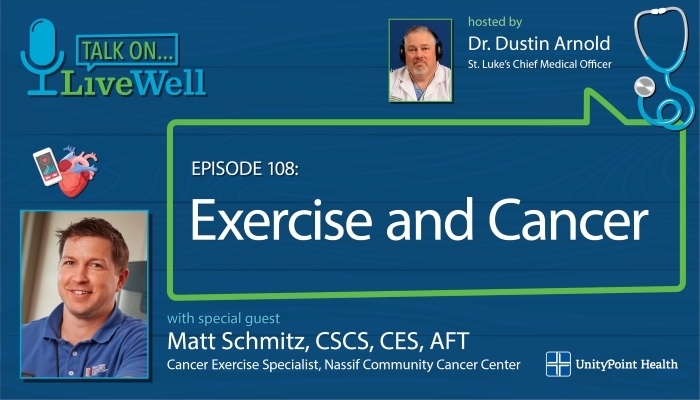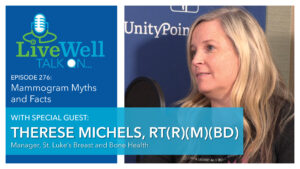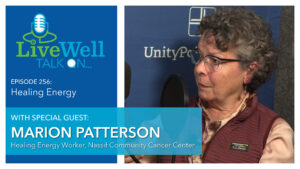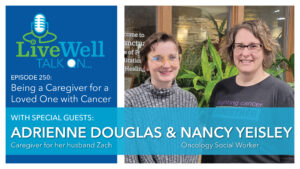Matt Schmitz, cancer exercise specialist and Integrative Wellness program manager, joins Dr. Arnold to discuss how exercise can help with cancer prevention, as well as benefit those going through treatment.
Subscribe on: Apple Podcasts | Google Podcasts | Spotify | iHeart Radio | Pandora | SoundCloud | Stitcher | TuneIn
Host
Dr. Dustin Arnold
Chief Medical Officer
UnityPoint Health – St. Luke’s Hospital
Matt Schmitz, CSCS, CES, AFT
Integrative Wellness Program Manager and Cancer Exercise Specialist
Helen G. Nassif Community Cancer Center
Transcript
***This podcast was recorded prior to the COVID-19 pandemic. In-person exercise classes are resuming at the Community Cancer Center tomorrow, Thursday, April 1. Masking and social distancing will be enforced, and class participants will be limited to nine.***
Dr. Arnold:
This is LiveWell Talk On exercise and cancer. I’m Dr. Dustin Arnold, chief medical officer at UnityPoint Health-St. Luke’s Hospital. We all know the benefits of staying active, but did you know exercise can play a key part in cancer prevention and help cancer patients manage side effects of treatment? Joining me to talk about this is Matt Schmitz, integrative wellness program manager and cancer exercise specialist at the Helen G Nassif Community Cancer Center. Welcome.
Matt Schmitz:
Thank you for having me.
Dr. Arnold:
What are the benefits of exercise in general and then how does that apply to a patient with cancer?
Matt Schmitz:
So really the benefits are the same for somebody without cancer, then the same as somebody with a diagnosis of cancer. You get increased strength, cardiovascular function, range of motion, balance. All of those things that you hear on the news. The big difference is somebody with cancer, we’re going to kind of specialize that program to any of the side effects that they may also have. You know, that would include anything from neuropathy, balance, fatigue issues, stamina, strength. But the other big thing that I see that exercise does for that cancer patient is empowerment. A lot of times once they’re diagnosed with cancer, there’s kind of a protocol. You go see the doctor, the doctor says, you know, this is your best option. And then you follow that plan. From that plan they’re doing that. So exercise is a way that it really kind of empowers them. They can make choices. They’re doing something for themselves to make them feel better.
Dr. Arnold:
I mentioned earlier before the podcast, if I have cancer, I’m not going to the gym. I’m going to quit, going to the gym. So I’m sure people feel that way. They feel kind of fatalistic. I’m going to go through this chemo. I have a chance of response and remission, not necessarily cure. How do you motivate them?
Matt Schmitz:
So that’s the big thing is, I get this every single week. The hard part is getting in the door once they’re in the door. I have one guy that every single week goes, I should be here every single day. And I said, you should be doing this at home every single day. And he does. But when he comes in, he’s tired, he’s fatigued, you know, treatment’s taken a toll. By the time he leaves, he feels absolutely great. He’s smiling, he’s laughing and he says, I’ll see you next week bud. You know, that type of thing. It completely changes kind of that mindset and it goes along with all of those side effects with treatment too, you know, the fatigue. That’s a huge one. And exercise is one that’s proven that the right amount can really help with that fatigue. One thing that we may talk about later is at first diagnosis I always meet with somebody and I give them a scale before they even start any treatment. And I say, this is different than your normal exercise routine. Normally you always want to be gaining every single day. You know, I want you to judge 0 to 10 how you’re feeling that day and it’s going to change throughout that cycle of treatment. You know, if you’re on chemotherapy. If you’re feeling like a three that day, walk around the block, play with the dog, that type of thing. Do something active just to keep yourself going. But if you do too much, you’re actually going to be more tired. So a lot of it’s more about education also and helping them get through that.
Dr. Arnold:
I imagine you’re not training people for CrossFit games. So do you set individual goals for each patient? Is it goal oriented? Is it symptom oriented? How do you make those decisions?
Matt Schmitz:
Both of those things. So we see everybody, even on my schedule today, there’s people anywhere from age 30 up to 75, you know, each of those are going to have different types of exercise.
Dr. Arnold:
Yeah, that makes sense.
Matt Schmitz:
You know, a 30 year old woman with kids, she’s going to have different needs, different ones, that type of thing with exercise. If I’m seeing that person pre-surgery, I’m going to educate her on what’s your normal routine? And if she says at night I read to the kids and I say, did they sit on your lap? You know, that type of thing. Okay, you got surgery coming up, for the next couple of weeks, let’s have them sit beside you and read that way. So it’s not just the exercise, but it’s education all the way around. If there’s a 45 year old male that’s coming in that works hard, manual labor, and he’s going to be out for four weeks, the end of that four weeks, his work’s going to expect him to be back to shape.
Dr. Arnold:
Right.
Matt Schmitz:
So when you’re talking about CrossFit, no, we’re not going to be doing CrossFit, but we’re going to detail it back towards his normal work schedule. And if he’s expected to lift 40-50 pounds, that’s our goal at the end of it. So why always judge it? Here’s the starting point. Here’s the end point we got to get to here by the end so that you can get back to your normal life. A 65 year old woman that recently retires, has grandkids. Her goal may be completely different. It’s to get down on the floor, to be able to get back up with their grandkids, you know, that type of thing. Or be able to hold them and stand up off of a chair without having to use her arms. So it’s different for everybody.
Dr. Arnold:
Speaking of difference, is it different for different types of cancer? Are there some cancers that exercise…I mean, I’m inferring from what you’re saying Matt, that exercise benefits all patients, whether they have cancer or not. I mean that’s a given. But are there certain cancers that yes. This the exercise is vital for this particular diagnosis?
Matt Schmitz:
You know, there’s different types of cancers. It’s definitely vital for all of them in different ways. If it’s a lung patient, my goal with them, if I see them before surgery, get them breathing as good as they can. You know, our natural instinct is if it’s tough to breathe, we almost crouch over, we’re trying to catch our breath. Our shoulders are for, my goal is the opposite. I want to get your shoulders back so it expands your lungs and you can get back to breathing as well as you can. And if we can adjust that prior to surgery, it makes that recovery a whole lot easier too. Same thing with a breast patient that’s getting ready for surgery. If I can see them prior to that surgery, check their range of motion, check their strength, we’re ahead of the game at that point. That’s our goal then afterwards of lifting that arm just as high as it was before. And it’s interesting because a lot of times, you know, not everybody exercises or does certain types of exercise. A lot of times their range of motion improves after surgery. Their strength improves after surgery. They feel better. Sometimes it’s a kickstart or they’re like, I should have been doing this years ago. Now I’ve started.
Dr. Arnold:
Yeah, I mean, well personally I do a marathon just about every weekend. Meaning I watch Netflix, marathon, some television show. So what are the benefits of exercise with cancer prevention? I mean independent of hopefully someone that is exercising and not smoking. So therefore they have less risk of smoking-related disease. Someone that’s exercising perhaps has less obesity, which we have, including rectal cancers associated with obesity is one that comes to mind right away. So take me through that, what advice would you give to the baby boomer couch potato to be doing to prevent cancer?
Matt Schmitz:
Prevention wise, it’s, it’s the same protocol. I mean, if you can get cardio five days a week for 30 minutes, you know, which is a lot. But every single study that I read or if I go to a conference, they’ll say they’d love to push it to an hour a day. They don’t want to publicize that because not enough people do the 30 minutes.
Dr. Arnold:
They think it’d be a turn off.
Matt Schmitz:
They’re afraid, they’d say I’m not going to do it all. So that’s one of those things that the more you do, the better. Strength-wise you’re maintaining that strength also. But it’s, I mean, it’s proven that exercise and diet reduces your risk of at least 13 different types of cancer. Like you said, there’s colon, there’s digestive, it has a hormonal effect also body fat. You know, all of those things change with our diet and our exercise. The other big thing is that, it changes that risk. It doesn’t eliminate it. So if you’re in better shape at diagnosis, hopefully the recovery is better. You’re gonna heal quicker. All of those good things also. So it’s really kind of two parts, the prevention and you’re just in better shape in general.
Dr. Arnold:
Sure. Dr. Nassif, the orthopedic surgeon, did a podcast with me and he talked about how doing physical therapy prior to surgery, even though surgery, it didn’t eliminate the need for surgery, but the recovery was stronger. You know, he made a good illustration of that. Yeah, you’re right. A lot of it’s genetics. I always kind of refer to genetics. It’s a graphic analogy, but think of it almost like a handgun that if it’s empty, it’s not dangerous, but you start adding smoking, obesity, sedentary lifestyle. You’re just putting bullets in the chamber, and it’s becoming more and more dangerous.
Matt Schmitz:
Yeah. Increases your risk each each time.
Dr. Arnold:
So you can work hard to get that gun empty. Less of a danger or you can…
Matt Schmitz:
And that’s also the fact that actually we were talking earlier about genetics. Even with those genetics, you know, that’s even more of a factor. What else can I do to prevent that, you know, genetics, they’re kind of against me right now. What else can I do lifestyle wise? And then it gets back to those things that you can change. The smoking, the eating, you know, the exercise, the diet, all of those things really do lower that risk.
Dr. Arnold:
We probably should have started out with this, but what was your training and how did you get involved in cancer exercise specialists? That is not a job that I see in the want ads. So it’s kind of a unique position. So tell us how you got here.
Matt Schmitz:
My background is actually kind of sports performance, exercise, nutrition, all of that good stuff. I originally worked for UnityPoint-St. Luke’s with the RoughRiders. So I was doing all of their sports performance training. It happened that my manager at that time was in a meeting and he knew my background, when I was in college. I’d worked with quite a few oncology patients, had good report with them and he brought me into this other meeting with the director of cancer services now and said, she’d like to start a program. It’s kind of just a trial program where our goal is to get about 25 patients, see if there’s a need or want, in the community for something like this and would you like to take it on? I said, absolutely. I always loved working with those patients while I was in college. Our goal, like I said, 25 I think over that first year. We hit a hundred at about a month and a half, two months into it. It just took off and from there, nothing more rewarding. I mean, the patients that I see, absolutely love seeing them. They’re there every week. I get new patients every week, which that’s unfortunate, but anything that I can do to help them, just amazing.
Dr. Arnold:
Yeah, that’s a fun part of medicine is to meet new people, hear their life story and how you can influence that positively. Well, this is really great information today. Matt, thanks for coming by and taking time. Again this was Matt Schmitz integrative wellness program manager and cancer exercise specialists at the Helen G Nassif Community Cancer Center. For more information, visit communitycancercenter.org.







